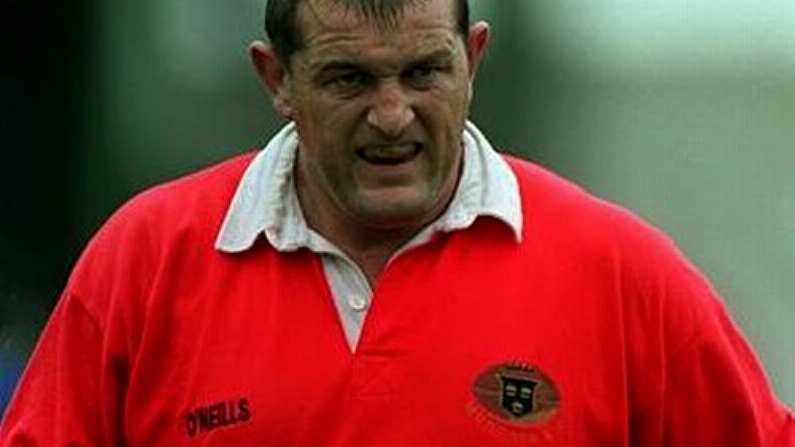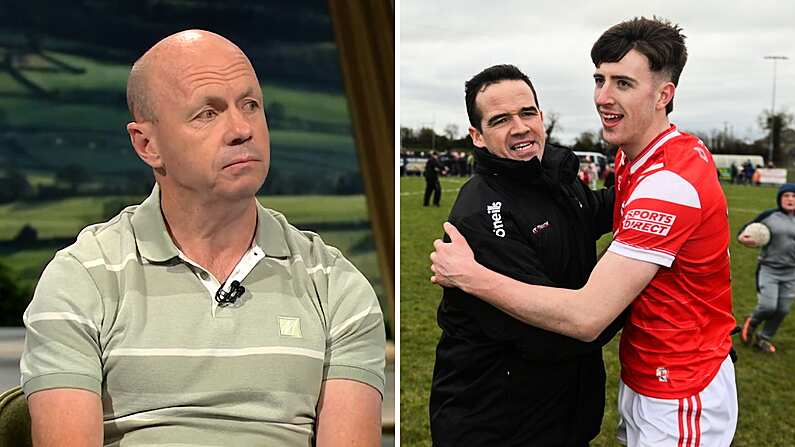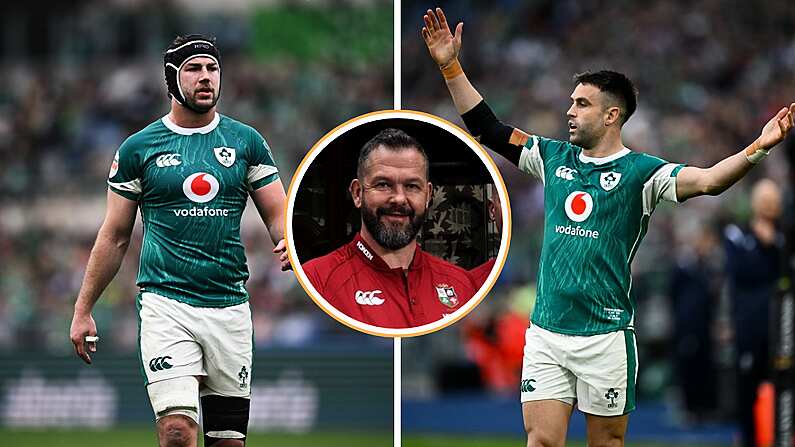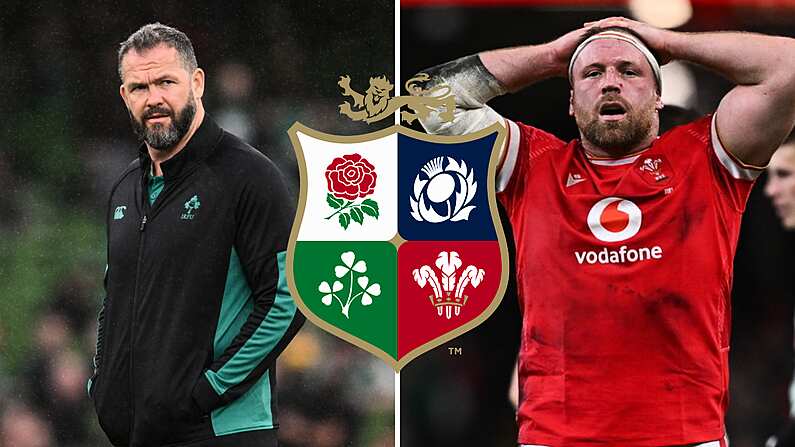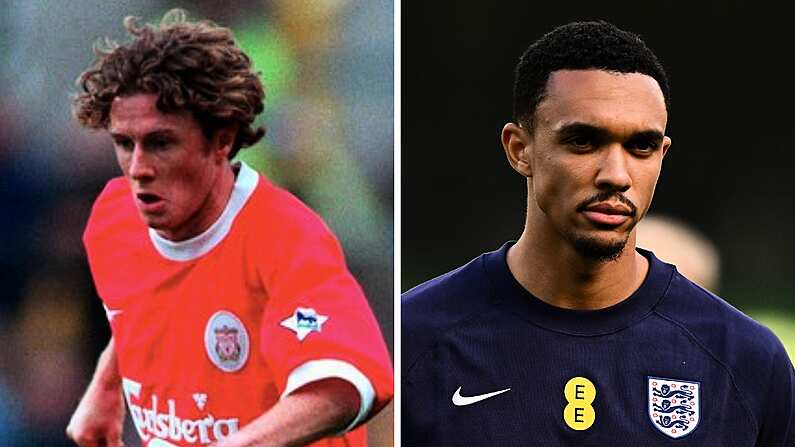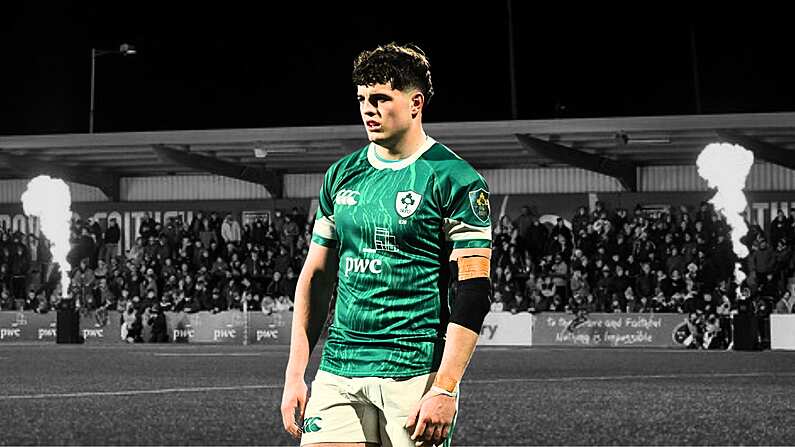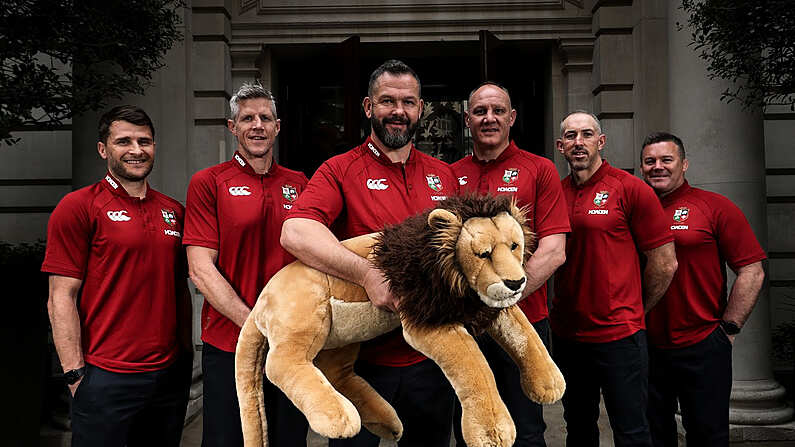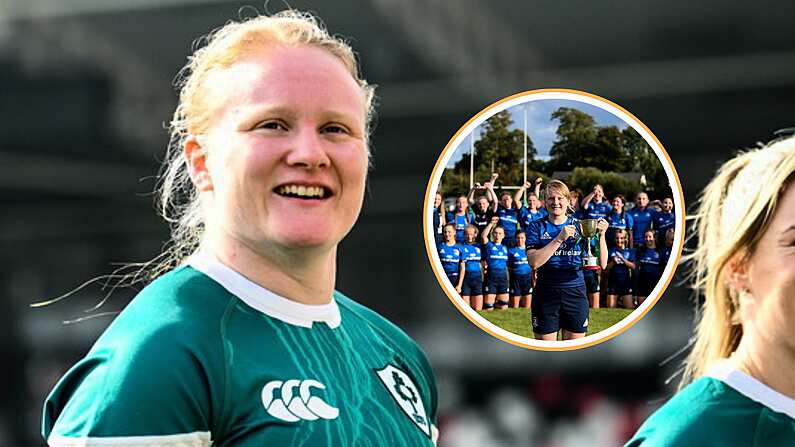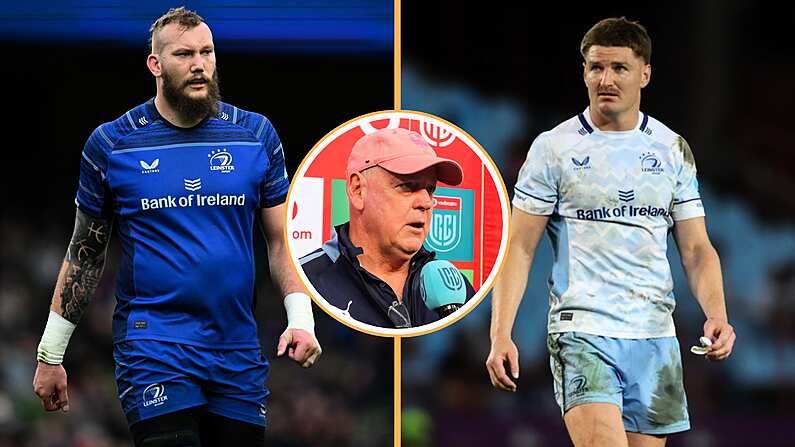It's Limerick in 1995 and everyone is obsessed with the fortunes of Garryowen and Shannon.
Munster only attract any crowds when one of the southern hemisphere powers come to town. No one gives a toss about the inter-provincial championship, the 'interpros', a long-standing but unloved competition that usually only attracts a few hundred battered veterans to Dooradoyle and Donnybrook every December.
However, this new competition seems a bit of a novelty.
A respectable enough crowd, estimated to be between 5,000 and 7,000, gathers in Thomond Park on a Wednesday afternoon (yes, a Wednesday afternoon) in November to watch Munster take on the all whites of Swansea in the first game of this newfangled competition. The extremely inhospitable kick off time is partly brought about by the absence of floodlights in Thomond Park.
Dr. Liam O'Callaghan, the author of 'Rugby in Munster: A Social and Cultural History', was one of those there that day, and recalls the feeling among the assembled as Munster dipped its toe into European competition for the first time.
There were a few thousand at it, there was no real fuss about it, and everybody in the crowd was just talking about the club fixtures of the previous weekend. This Munster thing was just a gentle distraction from the much more important business of AIL fixtures.
The current secretary of the Munster Supporters Club, Ian Buckley, then a 20-year-old, was also in the ground with his mate Kieran Hogan. The place wasn't so wedged that you couldn't do a lap of the pitch, wandering around, finding the best vantage point depending on where the action was.
The attendance was such at the stadium that both of us viewed the game by following the play quite easily by walking around the game to follow where the action was. It was quite easy to position oneself behind the goals at Conversion time , in a vain effort to be photographed... In terms of hype around the game, for us as supporters, we were more inquisitive as to how the new competition would take off, considering it was at a time when the AIL was the be all and end all in Irish competition terms
It's hard to believe now but Limerick folk hadn't much time for the whole Munster thing in the pre-Heineken Cup days. According to O'Callaghan, there was much resentment about the perceived pro-Cork bias in selection that saw players from working class areas of Limerick often excluded from the team. The most famous of these was Young Munster's hero from their 1993 AIL win, Ger Earls, who only managed 8 caps for Munster in his entire career.
Keith Wood also made his indifference to the provincial side plain for most of the 1990s. Wood was born in Clare but went to St. Munchin's and played for Garryowen, later leaving for the Premiership. Before Harlequins' cost-cutting measures led him to return for the 1999/00 season, he had played only three times for the province. And Munster was just a province then. Not a club. Certainly not to Keith Wood. Garryowen was his club.
The All-Ireland League was a different story. Limerick fell in love with the competition. After Cork Con won the inaugural competition in 1991, Limerick teams monopolised the League during its heyday. Garyowen picked up a couple of titles in the early 90s, Young Munster won it in dramatic circumstances in 1993, and then Shannon exerted a complete stranglehold on the event, winning it four years in a row from 1995 to 1998.
However, while the AIL was still the primary focus, the players acknowledged that the Swansea game was a step-up from the humdrum inter-provincial championship.
Mick Galwey was a key figure in the exceptionally strong Munster pack that lined out that day, all of whom were capped for Ireland at one stage or another.
It was a new competition and we didn't really know what was happening. But we could tell it was a step up from your interpro. Swansea were solid. They had a few internationals, the Llewellyns, who I played against when we played Wales.
International winger Richard Wallace ran in Munster's first try after good work from half-backs David O'Mahony and Paul Burke, giving them a 7-6 lead at half-time. Smith stuck another penalty early in the second half, before a sucker-punch try from Swansea's Alan Harris, left it looking like it would be a flat opening bow in the new competition.
Late in the game, Burke popped a pass off to Pat Murray, who broke a tackle and lunged over the line for the winning score. There were still time for the Welsh side to mount a series of interminable tap and goes near the Munster line. But they were repelled and the home side won out.
The following week, Munster went to the south of France to face Castres where they were beaten 19 - 12 thanks to a late try.
During the early years, Munster's European campaigns tended to follow the same pattern, chastening defeat away from home (often in France) followed by a rousing victory back in Limerick. Thoroughly full time outfits like Wasps and Harlequins, whose sides formed the backbone of Jack Rowell's intimidating England team, were both humbled in Thomond Park in 1996 and 1997. Galwey never lost for Munster there (and hardly ever lost there for Shannon either.)
We didn't have much success for years, but the one thing we had, we had a great home record... I never lost at home. When the current players slag me and say I don't have a Heineken Cup medal, well, I tell them I never lost at home which is more important!
Munster did lose at home to Cardiff in 1997. But that was in Musgrave Park. The Thomond Park aura remained intact. Incredibly, Munster wouldn't lose a European game there until Leicester beat them in 2007. It was this record more than anything, and particularly their success against Premiership teams, that made English commentators sit up and take notice of the serious outfit that existed down in Limerick.
In this light, Pat Murray's late try takes on a whole new significance. Without it, the famous Thomond Park aura would have been stillborn, killed stone dead before it acquired any momentum.
Between '95 and '98, the travelling support at Munster's away games was restricted largely to friends and relatives of the players. This began to change by '99. By the time the new decade rolled around, Munster mania clicked into gear. Liam O'Callaghan innocently recalls the different logistical challenges involved in buying tickets for the Toulouse semi final (2000) and those involved in acquiring them for the following year's semi-final against Stade Francais.
The Munster branch used to have their offices on Penrose Quay in Cork and in advance of a semi-final, I think in 2000, I just walked in there and bought tickets. They were selling them over the counter.
The next year, just twelve months later, the queue was down as far as the train station.
Here is the Munster team that lined out that day against Swansea: Click here to see the first Leinster team to play in the Heineken Cup in Milan in 1995.
15. Pat Murray
Murray's late winning try that day in Thomond Park is probably his famous act in a Munster jersey. He played for the province for twelve years, making his debut in 1984.
A Shannon stalwart who grew up within ten minutes of Thomond Park, Murray captained Shannon to three successive AIL titles from 1995 to 1997, and was coach when they completed a remarkable four-in-a-row in 1998.
After he retired he coached the Irish U-19 team. He played his final game for Munster against Wasps in 1996. An amateur until the end, he told the Examiner in 2006 of his decision to leave: "with the pros coming it, they were getting stronger and faster, well faster mainly."
14. Richard Wallace
Wallace has the honour of being the first Munster player to score in the Heineken Cup when he scored the opening try against Swansea. Played 29 times on the wing for Ireland between 1991 and 1998. He scored Ireland's only two tries in the 1992 Five Nations.
He signed for Saracens in the summer of 1996, but as with many players contracted to English rugby, was still able to return to play European games for Munster and played in the 1996/97 season. He eventually finished his career with Saracens.
He works as a pilot for CityJet.
13. Sean McCahill
A slight New Zealand born centre, McCahill was the brother of Bernie McCahill, New Zealand centre in the late 80s and early 90s. McCahill went on to earn one cap for Ireland against Fiji in 1995 and featured in Munster's 1996 victory over Wasps.
He played in the AIL for Sunday's Well. He later moved to Harlequins, playing for them in the late 90s.
12. Dan Larkin
A utility back, Larkin had started at out-half for Munster's famous victory over the Wallabies in 1992 (though he went off injured and replacement Jim Galvin kicked the winning drop goal) and won two AIL titles with Garryowen in 1992 and 94. A Munster veteran since the '80s, he also faced New Zealand in 1989.
11. Kenny Smith
A penalty kicking winger, Smith was a key figure in Murray Kidd's AIL winning Garryowen side of 1992 and picked up another title in 94. Smith was Munster's goal-kicker in both of their Heineken Cup games that season, but was replaced by Dominic Crotty the following year.
10. Paul Burke
London born outhalf, Burke played for Cork Constitution and Munster for two seasons, helping them to the inter-provincial title in 1995, before taking off to Bristol. He later played four seasons for Harlequins before re-joining Munster in 2003 as cover for Ronan O'Gara. He made his international debut against England in the 1995 Five Nations and travelled to that year's World Cup.
He is currently Leicester backs coach.
9. David O'Mahony
The Cork Constitution man played for UCC and Oxford University in the early 90s, and transferred to Lansdowne in 1996. He captained Leinster during the 1999/00 season.
He earned one international cap against Italy in Treviso in May 1995, where Ireland became the first 'Top 8' side ever to lose to Italy after their bus failed to show up, and the team had to be ferried to the ground in a fleet of taxis, arriving there 40 minutes before kick-off.
O'Mahony retired in 2002, going on to coach Dolphin and Clonakilty in the AIL.
1. John Fitzgerald
John 'Paco' Fitzgerald was capped 12 times for Ireland between 1988 and 1994, making his debut in the 1988 Five Nations victory over Scotland (Ireland's last win over the Scots for 12 years) and earning his last cap on the punishing summer tour of Australia in 1994.
He played inter-provincial rugby for Munster throughout the 80s and 90s. He featured in Munster's famous 49-22 win over Wasps in 1996 and left the provincial fold after the 1996-97 season. A Young Munster man, he later coached the club, giving Paul O'Connell his first start in the All-Ireland League.
2. Terry Kingston
Kingston captained Munster on numerous occasions between 1984 and 1996, most famously during the victory over Australia in 1992.
The Dolphin man earned 30 caps for Ireland between 1987 and 1996, tussling with Ulster's Steve Smith for the hooker spot until 1993 when Kingston nailed down the role. He featured in the most unlikely pair of back-to-back victories ever recorded against England in 1993 and 94. He played in three World Cups and his final match for Ireland came in a typically unforgiving Parc des Princes mauling in 1996.
He currently coaches Midleton RFC.
3. Peter Clohessy
The Young Munster icon played his final game of rugby altogether in the 2002 Heineken Cup final in Cardiff. Dejected at the finish, Clohessy couldn't be bothered going out to collect his second runners up medal as he already had one of them. However, he was phlegmatic about the 'Hand of Back' incident observing that had a Munster player done it, everyone would be congratulating him.
Clohessy played hardly any rugby during the schooldays in Crescent College, but began with Young Munster in his late teens. He made his Munster debut in Ravenhill in 1987.
For the 1996-97 season, not long after the notorious stamp in the Parc des Princes, he left to play for the Queensland Reds, but returned to Munster the following year.
Clohessy broke into the Irish team in the 1993 Five Nations, a period which coincided with an upturn in Irish fortunes after a grinding losing streak in 1992. He made his final appearance for Ireland against France in the 2002 Six Nations.
He owns Clohessy's Bar and the Sin Bin nightclub in Limerick.
4. Mick Galwey
Galwey played for Shannon for 20 years, Munster for 18 years, and Ireland for 11 years until his retirement in 2003. He captained Munster in both the 2000 and 2002 Heineken Cup finals. He earned 41 caps for Ireland between 1991 and 2002, scoring three tries, the most famous one being the one which copper-fastened the unexpected victory over England in 1993. He was one of just two Irish players originally selected for the 1993 Lions tour (the other being Nick Poppelwell).
Due to the proliferation of Irish locks at the time (Neil Francis, Paddy Johns, Gabriel Fulcher, Malcolm O'Kelly and, in later years, Bob Casey) Galwey famously became the most dropped player in the history of Irish rugby. However, the obvious corollary of that is that he was also the most recalled player in Irish rugby. He was the second row in situ at the beginning of Irish rugby's renaissance in 2000.
He won 5 AIL titles as a player with Shannon from 1995-98 and 2002 and coached the club to two more titles in 2005 and 2006. It barely needs pointing out that he also won an All-Ireland title with Kerry in 1986. He works for Netwatch.
5. Gabriel Fulcher
The Cork Constitution lock played 20 times for Ireland between 1994 and 1998. Highlights include scoring a try against Wales in the '96 Five Nations. Like a raft of Irish players in both Munster and Leinster, he left for Clive Woodward's London Irish in 1996, staying for two seasons. He returned to Ireland in 1998, but not to Munster. He played for Leinster between 98 and 2000, captaining them during the 99/00 season.
He is currently Director of Rugby at St. Mary's and is involved with the O'Brien sandwich franchise.
6. Eddie Halvey
During the mid-90s, Munster were particularly famed for their back-row. As Galwey observed "they were falling over each other to get to the breakdown," Halvey was regarded as the most promising of the trio, but by November '95, he had already played his final Five Nations match against Wales in 1995. An important figure in the '95 World Cup, he scored a crucial try in the 24-23 win over Wales in Johannesburg which sent Ireland into the quarter-finals. He did feature in Ireland's loss New Zealand in 1997.
He was a major figure in Munster's first major charge in the Heineken Cup in 1999/00, scoring a vital try in the famous semi-final win over Toulouse. He left for London Irish after the loss to Northampton but returned to Munster two years later.
Like his back row counterpart Foley, he was a vital part of the Shannon machine that won four successive AIL titles.
7. Anthony Foley
Sadly no longer with us but he was only player that day who would hang around long enough to win a Heineken Cup, Foley, who's father was on the historic 1978 team, ended up winning two of them, captaining on both occasions. Foley was pretty much an ever present in a red jersey from 1995 until his retirement, shortly after that second Heineken Cup win, in 2008.
He had already broken into the Ireland team in 1995, scoring a consolation try against England in the 1995 Five Nations. He played his last game for Ireland in 2005. He was picked at flanker for the match though in time would become an 8.
8. David Corkery
Corkery was flying in 1995 and earned the accolade of Ireland's 'Player of the Tournament' at the 1995 World Cup. He won 27 caps for Ireland between 1994 and 1999. He left for Bristol as part of the big exodus of 1996, when it looked like Irish rugby was going to lose all of its players to the Guinness Premiership. He played there for two seasons before returning to Munster. He played in the All-Ireland League for Cork Constitution and (post-Bristol) Terenure.
He spent five years as a development officer with the IRFU. Earlier this year, at the age of 41, he played two games for Sunday's Well in the AIL, and was on the winning side in both.
He spoke to Vincent Hogan recently about his battle with depression both during and after his rugby career. He currently works as a account manager at Vivomed sports medicine company.
Management team:
Coach : Jerry Holland
Manager : Colm Tucker

